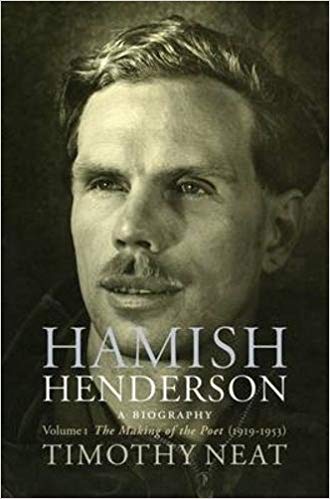 Hamish
Scott Henderson, (11 November 1919 – 9 March 2002) was a Scottish poet,
songwriter, communist, soldier and intellectual.
Hamish
Scott Henderson, (11 November 1919 – 9 March 2002) was a Scottish poet,
songwriter, communist, soldier and intellectual. Queer Places:
29 York Rd, Edinburgh EH5 3EG, UK
University of Edinburgh, 30 George Square, Edinburgh EH8 9LJ, UK
University Of Cambridge, Cambridge CB2, UK
 Hamish
Scott Henderson, (11 November 1919 – 9 March 2002) was a Scottish poet,
songwriter, communist, soldier and intellectual.
Hamish
Scott Henderson, (11 November 1919 – 9 March 2002) was a Scottish poet,
songwriter, communist, soldier and intellectual.
He has been referred to as the most important Scots poet since Robert Burns and was a catalyst for the folk revival in Scotland. He was also an accomplished folk song collector and discovered such notable performers as Jeannie Robertson, Flora MacNeil and Calum Johnston.
Born to a single mother in Blairgowrie, Perthshire,[1] Henderson eventually moved to England with his mother. He won a scholarship to the prestigious Dulwich School in London; however, his mother died shortly before he was due to take up his place and he was forced to live in an orphanage while studying there.
He studied Modern Languages at Downing College, Cambridge in the years leading up to World War II, and as a visiting student in Germany ran messages for a Quaker organization aiding the German resistance and helping to rescue Jews.[2][3]
Although he argued strongly for peace, even well into the early years of the war, he became convinced that a satisfactory peace could not be reached and so he threw himself into the war effort. Joining as an enlisted soldier in the Pioneer Corps, he later applied for and received a commission in the Intelligence Corps. He was quite effective as an interrogator due to his command of six European languages and deep understanding of German culture.
He took part in the Desert War in Africa, during which he wrote his poem Elegies For the Dead in Cyrenaica, encompassing every aspect of a soldier's experience of the sands of North Africa. On 2 May 1945, Henderson personally oversaw the drafting of the surrender order of Italy issued by Marshal Rodolfo Graziani.[4]
Henderson collected the lyrics to "D-Day Dodgers," a satirical song to the tune of "Lili Marlene", attributed to Lance-Sergeant Harry Pynn, who served in Italy. Henderson also wrote the lyrics to "The 51st (Highland) Division's Farewell to Sicily", set to a pipe tune called "Farewell to the Creeks". The book in which these were collected, Ballads of World War II, was published "privately" to evade censorship, but earned Henderson a ten-year ban from BBC radio, preventing a series on ballad-making from being made. His 1948 poetry book about his experiences in the war, Elegies for the Dead in Cyrenaica, received the Somerset Maugham Award.[2]
Henderson threw himself into the work of the folk revival after the war, discovering and bringing to public attention Jeannie Robertson, Flora MacNeil, Calum Johnston and others. In the 1950s, he acted as a guide to the American folklorist, Alan Lomax, who collected many field recordings in Scotland.
Henderson was instrumental in bringing about the Edinburgh People's Festival Ceilidh in 1951, which placed traditionally performed Scottish folk music on the public stage for the first time as "A Night of Scottish Song". However, the People's Festival, of which it was part, was planned as a left-wing competitor to the Edinburgh Festival and was deeply controversial. At the event, Henderson performed a song, to the tune of Scotland the Brave, which glorified John Maclean, a communist and Scottish nationalist hero.
However, the event marked the first time that Scotland's traditional folk music was performed on a public stage. The performers included Flora MacNeil, Calum Johnston, John Burgess, Jessie Murray, John Strachan, and Jimmy MacBeath. The event was extremely popular and was regarded as the beginning of the second British folk revival.
Henderson continued to host the events every year until 1954, when the Communist ties of several members of the Peoples Festival Committee led to the Labour Party declaring it a "Proscribed Organisation". Losing the financial support of the local trades unions, the Peoples Festival was permanently cancelled.[5] Henderson's own songs, particularly "The Freedom Come All Ye", have become part of the folk tradition themselves.[2]
Dividing his time between Europe and Scotland, he eventually settled in Edinburgh in 1959 with his German wife, Kätzel (Felizitas Schmidt).
Henderson collected widely in the Borders and the north-east of Scotland, creating links between the travellers, the bothy singers of Aberdeenshire, the Border shepherds, and the young men and women who frequented the folk clubs in Edinburgh.
From 1955 to 1987 he was on the staff of the University of Edinburgh's School of Scottish Studies which he co-founded with Calum Maclean: there he contributed to the sound archives that are now available on-line. Henderson held several honorary degrees and after his retirement became an honorary fellow of the School of Scottish Studies. For many years he held court in Sandy Bell's Bar, the meeting place for local and visiting folk musicians.
Henderson was a socialist,[2] and beside his academic work for the University, he produced translations of the Prison Letters of Antonio Gramsci.[6] whom he had first heard of among Communist Italian partisans during the war. The translation was published in the New Edinburgh Review in 1974 and as a book in 1988.[2] He was involved in campaigns for Scottish home rule and in the foundation of the 1970s Scottish Labour Party. Henderson, who was openly bisexual, was vocal about gay rights and acceptance.[2][7]
In 1983, Henderson was voted Scot of the Year by Radio Scotland listeners when he, in protest of the Thatcher government's nuclear weapons policy, turned down an OBE.[2]
He died in Edinburgh on 8 March 2002 aged eighty-two, survived by his wife Kätzel and their daughters, Janet and Christine.
My published books: